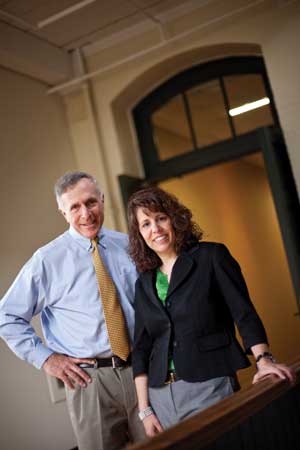Famed Sports Agent Helps Hopkins Nurse Excel in Business

by Kelly Brooks and Jonathan Eichberger
When JoAnn Z. Ioannou, DNP, MSN, MBA, RN, applied for the Executive Mentorship Program, “I was interested in learning to be a more effective negotiator.”
Her job is a high-stress, high-responsibility position, and she finds herself negotiating with other nurses, physicians, patients, and hospital leaders each and every day. Through the mentorship program, which matches Doctor of Nursing Practice students at Johns Hopkins with top-level executives, she was paired with famed Baltimore sports agent and attorney Ron Shapiro. Shapiro is also Co-Founder and Chairman of Shapiro Negotiations Institute and the New York Times best-selling author of The Power of Nice; Bullies, Tyrants & Impossible People; and Dare to Prepare.
When they were first matched, Ioannou, who is Assistant Director of Nursing in the Department of Medical Nursing at The Johns Hopkins Hospital, barraged Shapiro with questions, some of which were quite personal. “JoAnn has no fear. She’ll ask whatever she needs to ask to reach her objective,” Shapiro said. And Ioannou wanted to make sure her mentor would be a good match for her. It worked perfectly, said Shapiro, because “I have no fear of being vulnerable and answering personal questions about my life.” The two hit it off immediately.
Ioannou says the most valuable lesson she learned from the time she spent with Shapiro was the importance of listening to the needs of others. “It’s difficult for me to go into a negotiation without an agenda. But I need to listen to everything that’s on the table and think ‘What’s the most important thing to the other person?’” Shapiro also taught Ioannou to “do her homework” and be methodically prepared before she walks in a room.
For example, new Accreditation Council for Graduate Medical Education rules permit interns and residents to work only 16-hour shifts, a change that would leave the hospital short-staffed. Ioannou’s primary responsibilities are to ensure smooth hospital operations, financial responsibility, and continuity of care, but she’s also working with physicians who need to preserve the hospital’s academic mission. To come up with a solution that meets everybody’s needs, Ioannou used the skills she learned from Shapiro.
“I asked myself, ‘What can we provide, and what are our best options?’ I learned it’s important to work collaboratively to come up with a solution,” Ioannou noted. By working with other administrators, Ioannou was able to identify nurses, such as ACNPs, to help with coverage issues at the hospital.
Now that the mentorship is over, Ioannou still goes to Shapiro on occasion. “He’s a friend for life.”
****************************************
Executive Mentorship Program
The one-year program pairs DNP students with top executives from non-nursing fields such as business, finance, media, science, and technology. Each year, one to three students are chosen to receive up to $5,000 to support the cost of expenses including travel, books, and conference attendance. Professor Maryann Fralic, DrPH, RN, created and funded the program in 2008.
2011 Student-Mentor Pairs
Barbara Buchko, MS, BSN and Maureen Bisognano, President and CEO, Institute for Healthcare Improvement
Kimberly Jill Elenberg, RN, MS and Patricia Thompson, RN, EdD, FAAN, CEO, Sigma Theta Tau International Honor Society of Nursing